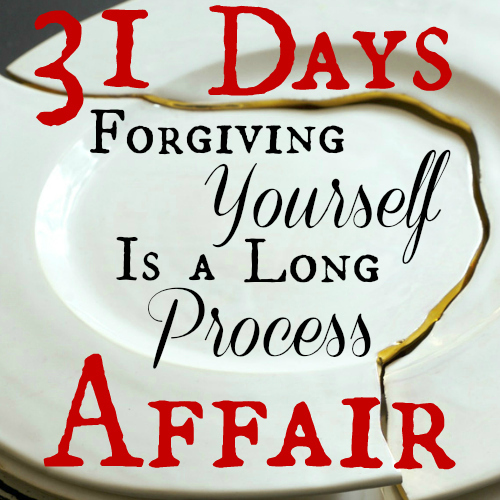
This is Day 26 in the series “31 Days: What You Should Know Before An Affair“
Day 26
For years, my soul navigated an undercurrent of shame. Forgiving myself was like weaving through a corn maze in autumn—I knew it was possible to get through, but found dead ends at every turn. With planted maze walls taller than me, I spun in confusion over where I’d just walked, with no visibility to find my way through. Each passageway looked promising, but then went nowhere. I could never get through to the other side.
My heart and mind experienced life through shame’s filter, with shame warping and obscuring my view, like colored theater lights turning everything red. I lived with this muted clarity and fuzzy insight—sometimes pressing on, sometimes numbing within, and sometimes denying the reality of my shame. It was always there, and because of it, I lived lonely—feeling not enough—feeling marked forever by the decisions I’d made, and confident I’d be promptly rejected if anyone really knew what I’d done. Shame became a vague sense within me—a punishment of sorts—challenging for me to articulate to myself or others, let alone to understand.
Over time, adversity inevitably came, and I saw it through my lens of shame—this idea that I was unworthy of good things, and unworthy of love and blessing because of what I’d done. Soon after I remarried I came to cerebrally believe God loved me and had forgiven me, I just wasn’t sure God liked me. And as the natural consequences of my choices played out over time, I began to see the hard as what I deserved.
In the first year I was remarried, I still remember curling up on the couch that last Wednesday in May, just two weeks after the pink lines appeared on all three tests—three because I just couldn’t believe it could be true. We were so thrilled about the idea of a baby. Yet no sooner did our hopes rise, they came crashing down with cramping and bleeding and loss. It was the very day of what would have been my 9th wedding anniversary had I never divorced, and it brought a depth of pain and shame I’d not yet known.
This baby I’d come to want so badly would never be. And even though I’d only been imagining her life for the past two weeks, I’d made plans. I had dreams. And when they shattered on that Wednesday in May, it seemed like no coincidence and most definitely a punishment I deserved. What are the chances I would lose a baby on that exact day?
I became convinced that the loss was a message from God—a reality check that I was unworthy of being a mother. My own heart chided how I may have gotten my way to divorce and remarry, but I’d never again be a mother. And on the couch that day I just sat, and stared, and cried.
You need to know that forgiving yourself is a long process.
You’ll fight the voices of shame—mocking that you deserve no good thing—taunting that any tragedy will be what you deserve. You won’t believe you’re worthy and you’ll be unsure you deserve to ask if you are.
Eventually forgiving myself was only possible after first accepting I was completely forgiven by God. As I showed up each day and dared to read His Word, to spend time in prayer, and absorb the truth of His character and ways, over time I realized that refusing to forgive myself and staying stuck in a life of shame, minimized and denigrated the gift of God’s grace. And it was only when I finally saw His view of me, I was able to risk having the same view of myself.
In light of what Christ had done, I realized my shame filter had become self-abuse—a futile attempt at control—a way to wallow in self-pity. It was me abdicating responsibility for anything ever being demanded of me in response to what Christ had done for me, hoarding His mercy and grace.
It took more than ten years to get through the maze and get over myself—to believe God’s truth instead of clinging to my self-condemning shame. I learned that pain and suffering are never punishments from God, but gifts driving us to Him—gifts providing opportunities for us to surrender and cling to Him, and become more like Him in the process.
Much has happened since that day I cried on the couch. Amidst two more losses, God gave us four beautiful children—each one a blessing and a gift straight from Him. He has been so good to me.
Forgiving yourself is a long process. Be patient with yourself.
For me it’s been a long journey, not a quick trip—one I’ll most likely travel forever–marked and changed by my choices, but loved, and forgiven, and free.
How have you struggled to forgive yourself?
What has helped you along the way?
Read Day 27 HERE
Throughout this series, if you have a question or a struggle and want me to address it or write on it in this series, please send me an email (jacque at jacquewatkins dot com) or a voicemail (green button on right sidebar) and I will do my best to incorporate it into this series. It will make me so happy to have feedback from you and to write what it is you might need. I can’t wait to hear from you.





Oh…Thank you for articulating that so beautifully. I’ve walked shame of a different kind, and the only way out is God’s mercy and grace. It took me a long time to understand the Spirit brings godly sorrow, repentance and freedom, not shame and condemnation.
I, too, endured the shame for a time. When it finally came to me that it was a belief issue on my part, it had a glimmer of hope but seemed silly that it could be as simple as that, to just believe what God says about me and who I am in Christ. I can now say with the passage of time and making the choice to believe that the shame has tremendously diminished.